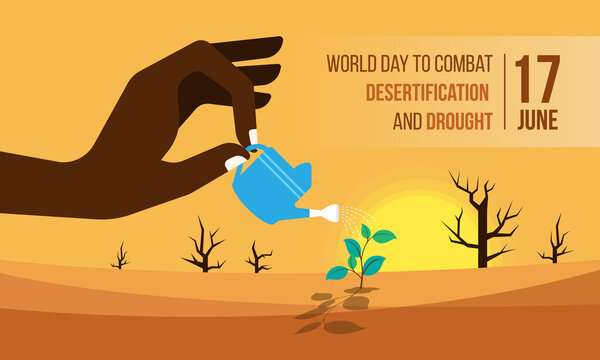World Day to Combat Desertification and Drought

Introduction:
World Day to Combat Desertification and Drought, observed on June 17th each year, serves as a reminder of the urgent need to address the global challenges of land degradation, desertification, and drought. This day aims to raise awareness about the devastating impacts of these phenomena and to promote sustainable land management practices.
Historical Effects :
Throughout history, desertification and drought have profoundly impacted societies, economies, and ecosystems. Ancient civilizations such as the Sumerians, Mayans, and Khmers experienced the collapse of their once-flourishing civilizations due to desertification and drought. The Dust Bowl in the United States during the 1930s is another poignant example of the disastrous consequences of land degradation. Prolonged droughts, combined with unsustainable agricultural practices, resulted in severe soil erosion and massive dust storms, leading to agricultural devastation and forced migration.
Effects on Ecosystems:
Desertification and drought have far-reaching consequences for ecosystems. As fertile land transforms into arid desert, biodiversity declines, and ecosystems lose their resilience. Deforestation, overgrazing, and improper irrigation practices exacerbate the problem. The loss of plant cover, combined with soil degradation, accelerates desertification processes, creating a vicious cycle. Ecosystems provide essential services such as water filtration, carbon sequestration, and habitat for countless species. Their degradation disrupts these services, impacting the availability of clean water, exacerbating climate change, and threatening the survival of both flora and fauna.
Socioeconomic Impacts :
The effects of desertification and drought are not limited to environmental concerns but also have significant socioeconomic implications. As fertile land becomes unproductive, agriculture and livestock-rearing suffer, leading to reduced food production and income generation. Impoverished communities heavily reliant on agriculture are particularly vulnerable, as their livelihoods are jeopardized. Migration increases as people are forced to leave their homes in search of more habitable regions, leading to social tensions and conflicts over scarce resources. Moreover, desertification and drought exacerbate poverty, exacerbate gender inequalities, and hinder sustainable development efforts in affected regions.
Addressing the Challenges :
The World Day to Combat Desertification and Drought serves as a call to action to combat these pressing issues. It highlights the urgent need for sustainable land management practices that restore degraded lands, preserve biodiversity, and enhance resilience to drought. Governments, international organizations, and local communities must collaborate to implement measures such as afforestation, reforestation, sustainable farming techniques, and water management strategies.
Investments in research, education, and capacity-building are vital to develop innovative solutions for combating desertification and drought. Public awareness campaigns and policy initiatives should promote sustainable land use, support small-scale farmers, and encourage the adoption of climate-smart agriculture practices.
Conclusion:
World Day to Combat Desertification and Drought is a crucial reminder of the ongoing challenges posed by land degradation and water scarcity. By raising awareness, implementing sustainable practices, and fostering global cooperation, we can restore our land, secure our future, and ensure a sustainable and resilient planet for generations to come.
Tags:
17th JuneBest teachers in every subject.
Let’s get started
We can teach you anything
